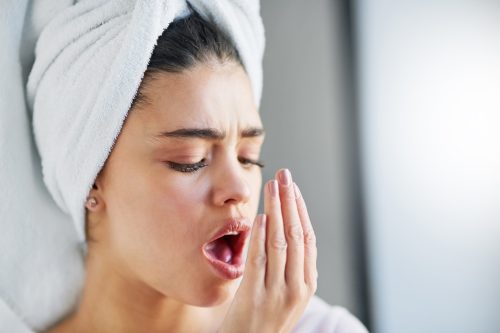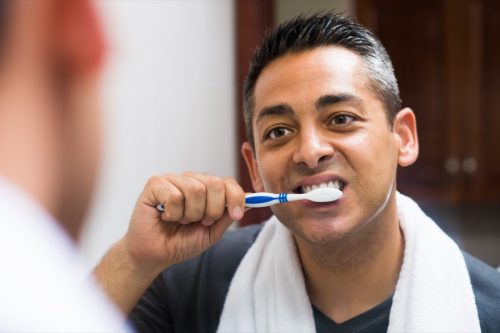What Happens If You Go to Bed Without Brushing Your Teeth, According to Dentists

Even if you’re usually on top of your oral hygiene routine, sometimes it can be tempting to skip brushing before you hit the sack. We’ve all been too tired to brush, or left our toothbrush at home when we’re traveling, or accidentally fallen asleep in front of the TV—and most of the time, it doesn’t seem like the end of the world. You brush when you wake up, go on with your day, and forget about it. But could that skipped brushing do long-term damage to your teeth?
While it’s true that occasionally missing your nighttime brushing won’t immediately cause drastic changes, it’s still not a great idea—especially if you have potential or existing conditions, says Greg Grillo, a dentist at Express Dentist. “Going to bed without brushing and flossing occasionally may not cause any long-term harm, but it also depends on the genetic and dietary risks of each patient,” he warns.
Skipping your nighttime brushing can also start out as a once-in-a-while habit and develop into something more frequent. But even if it’s just an occasional “oops-I-forgot” thing, you could be increasing your risk of long-term consequences. Read on to find out what they are.
READ THIS NEXT: This Common Bathroom Habit Is a “Disaster” for Your Teeth, Dentist Warns.
Plaque and tartar can build up.

Your dentist has probably talked about plaque build-up, but what exactly is it? “Plaque is a sticky film of bacteria that forms on your teeth and gums when food particles and bacteria mix, which can result in cavities,” explains Joyce Kahng, a dentist based in Costa Mesa, California.
Brushing and flossing helps reduce plaque, but WebMD warns that if plaque stays on your teeth, it hardens into tarter, which can cause serious problems, including gum disease. The site says you’ll have to go to your dentist to have tartar removed, especially if it’s below your gum line.
You may develop bad breath.

There are many types of bacteria in the world—some good, and some bad. And no matter how much you brush your teeth, bacteria is going to grow in your mouth, especially at night. During the day, saliva “helps flush the mouth… and creates a buffer against acids,” says Grillo.
But at night, you don’t produce enough saliva to do the job. “The fuzzy feeling on your teeth in the morning is due to the rapid growth of plaque,” Grillo says. And one of the (many) problems with plaque buildup is that it can cause odors, which then leads to bad breath.
Your teeth can become discolored.

Stained teeth can be caused by many things, including red wine, coffee, cola, tobacco use, and certain medical conditions, the Cleveland Clinic explains. But skipping brushing and flossing can do it, too: if you don’t brush your teeth before bed every night, your teeth may become discolored and stained due to plaque buildup.
To keep your teeth looking sparkling and clean, they say, be sure to brush and floss every night before your head hits the pillow. You can also try over-the-counter tooth whitening strips and trays, or have your teeth professionally whitened by a cosmetic dentist. But isn’t brushing at night easier (and cheaper)?
For more health news sent directly to your inbox, sign up for our daily newsletter.
Skipping nighttime brushing can have long-term consequences.

If not brushing at night becomes a habit, your teeth could be in trouble, says Grillo. “If someone often forgets to [brush] their teeth at night, the repercussions may be more severe,” cautions Grillo, who warns that plaque buildup “can develop into gum disease, resulting in tooth loss, gum recession, and even jaw bone loss.”
Grillo also points out that “tooth decay might progress, requiring fillings, crowns, or root canal therapy” and that “poor oral hygiene has been linked to other health issues, such as cardiovascular disease and diabetes.”
These potential health consequences of skipping brushing may be even more far-reaching than you think. Research shows that brushing your teeth twice a day can actually help reduce the risk of dementia. In addition, gum disease has been linked to a higher risk of having a heart attack.